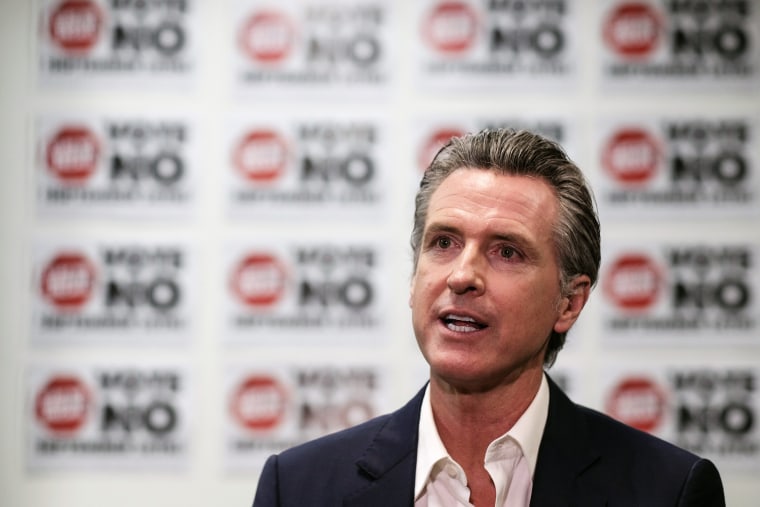WASHINGTON — It’s the day before the California recall election against Democratic Gov. Gavin Newsom, with President Biden campaigning for Newsom in Long Beach, Calif., at 10:00 p.m. ET (after touring wildfire destruction on the West Coast).
And just in case you haven’t been tuning into everything that’s happened in this recall — including how we got here in the first place — here’s a description by the numbers:
Six: The total number of recall attempts against Newsom since he took office in 2019.
One: The number of recall attempts against Newsom that successfully made the ballot.
1,495,709: The number of valid signatures that recall organizers needed — and ultimately exceeded — to place this recall on the ballot (representing 12 percent of the vote total from the 2018 California recall election).
Four: The number of months by which a California judge extended this recall’s signature drive, citing the Covid pandemic (and eventually aiding the recall effort).
Two: The number of questions on the recall ballot: 1) Should Newsom be recalled, yes or no? 2) If a majority say yes, who should replace him?
46: The total number of replacement candidates on the ballot, including GOP replacement frontrunner Larry Elder.
4,900: Reported Covid deaths in California when this recall petition drive first started in June 2020.
67,100: Reported Covid deaths in California as of today.
$276 million: The amount of money this recall election has cost the state of California.
$33.9 million: The amount of money in ads that Newsom and allies have spent on ads in this recall, per ad-spending data from AdImpact.
$17.4 million: The amount of money recall supporters and Republicans have spent on ads in this race.
60 percent to 39 percent: The margin by which recall opponents were ahead of recall supporters, per the recent LA Times/Berkeley IGS poll of likely voters.
38 percent: The percentage of likely voters picking Elder in the replacement election in the same poll, topping all other replacement candidates.
54 percent: The share of likely voters in California approving of Newsom’s job in the LA Times/Berkeley poll.
Around 20 to 30 percent: The approval ratings for former Gov. Gray Davis before he was successfully recalled in 2003.
63 percent to 34 percent: The margin by which Joe Biden defeated Donald Trump in California in the 2020 presidential election.
62 percent to 38 percent: The margin by which Newsom defeated his Republican opponent in his 2018 gubernatorial victory.
Tweet of the day
Decoding Manchin, part 39
Sen. Joe Manchin, D-W.V., wants a lower number than $3.5 trillion for the reconciliation package.
But what else he wants isn’t exactly clear.
That’s our takeaway from Manchin’s appearance on “Meet the Press” yesterday.
Chuck Todd: "So you're not against this? You could support this $3.5 trillion ..."
Manchin: "No ... I cannot support $3.5 trillion, okay? No, okay."
More:
Todd: "This still is a one-way negotiation. Look, you're in the catbird seat. You're the 50th vote, but don't you need to give, say, what you're for."
Manchin: "I have been giving. I could say that I'm against this and that and everything. I'm for an awful lot of the things. I'm for also putting guardrails on. I think that if you're going to make sure that we're helping our children, let's make sure the children are getting the best benefit of that. Let's make sure that a guardian or a parent is doing everything they can to nurture that child and give them the resources to do it. But if you don't have any work requirements, there's no means testing on so much of this.”
But this also caught our eye: Manchin said what’s in the reconciliation package might help West Virginians, but that he might not be able to explain it to them back home.
Manchin: "I've said this. If I can't go home and explain it, I can't vote for it, okay."
Todd: "And right now, you don't think you can explain it?"
Manchin: "I can't explain what we're doing now."
Data Download: The (other) numbers you need to know today
$2.9 trillion: How much House Democrats believe they can raise in new revenue for the reconciliation deal with tax increases and other policies.
930 miles: The distance North Korea’s new long-range cruise missile flew during a weekend test.
11: How many times more likely it is for an unvaccinated person to die from Covid when compared to a vaccinated person.
6th: America’s ranking out of the Group of Seven countries in rate of people fully vaccinated for Covid.
41,060,236: The number of confirmed cases of coronavirus in the United States, per the most recent data from NBC News and health officials. (That’s 296,952 more since Friday morning.)
663,758: The number of deaths in the United States from the virus so far, per the most recent data from NBC News. (That’s 3,611 more since Friday morning.)
380,241,903: The number of vaccine doses administered in the U.S., per the CDC. (That’s 2,619,838 more since Friday morning.)
53.8 percent: The share of all Americans who are fully vaccinated, per the CDC.
64.9 percent: The share of all U.S. adults at least 18 years of age who are fully vaccinated, per CDC.
ICYMI: What else is happening in the world
EMILY’s List has selected Laphonza Butler, a former labor leader and ally of Vice President Harris, to be its next president. She is the first woman of color to helm the group.
Qatar’s outsized role in assisting with the Afghanistan withdrawal is a reversal of fortune for the Middle-Eastern nation.
A New York hospital will “pause” delivering babies after staffers quit rather than get vaccinated.
Some public health experts are tangling with the Biden administration over its Covid vaccine booster plan.
Supreme Court Justice Amy Coney Barrett said Sunday that justices have to be “hyper vigilant to make sure they’re not letting personal biases creep into their decisions.”



